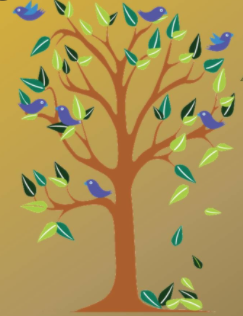
Operation Inspiration
I must have been in 4th or 5th grade when our English Principal, Mrs. B., read us a satirical poem based on the famous poem “Trees” written by Joyce Kilmer. He, you might like to know, was best known for this poem, not just for the rest area on the New Jersey Turnpike named for him, or the fact that he was a man named Joyce.
Since we didn’t really get what she was talking about (and we had no idea what bas-relief was – see Winter Trees by Conrad Dierkman,) she introduced us to the original. I only recall two lines by heart: the opening one, “I think that I shall never see, a poem as lovely as a tree,” and the closing one, “Poems are made by fools like me, but only G-d can make a tree.” These words played in my mind as I walked to shul one Shabbos afternoon.
I had just spoken to a dear friend and neighbor, and mentioned my understanding of a Mishna in Pirkei Avos. The Mishna in Perek Gimel teaches, “R’ Shimon says, one who is walking on the way and ceases from his learning to declare, “How lovely is this tree!” the Torah considers him almost worthy of losing his life.” The basic understanding is that one who interrupts his Torah learning with idle chatter, even to admire the wonders of Hashem, has done something wrong.
I told him that I focus on the word, “Mafsik, ceases.” It can also mean “to separate.” As I explained, if a person is steeped in Torah, then when he sees a tree, he doesn’t differentiate it from Torah. He asks himself, “What is Hashem telling me with this?” Since Hashem used the Torah as a blueprint for the world, that means everything in the world is ALSO Torah.
When I then began my walk, these thoughts swirled through my head and I asked myself that very question: What is Hashem telling us with His creation of trees in the world?
This is something I bet many of you would be really good at answering, since you’re very creative and imaginative. I hope that after reading this you’ll start that discussion, perhaps around your Shabbos table, or while driving down the road with your spouse, children, or friends. Like those games where you see how many words you can make from the letters of a long word, let’s see how many lessons you can find from a tree. Here’s my short list.
- Trees are always moving upwards. Not only that, they are taking the things that are low, the water and nutrients in the soil, and using them to create branches and leaves higher up. That’s very much like people who are supposed to uplift the physical and make it spiritual.
- I’ve also never seen trees lean over to try to knock each other down. It could happen in a windstorm, but not through any malice on the part of these wooden soldiers. Instead, they focus on growing as high as they can, and don’t worry about how tall the other trees are. Wouldn’t it be a swell idea if we were less competitive with others? We might be envious of someone else’s greatness, but if that serves to make us want to climb higher in our own Avodas Hashem, that’s OK, like the trees.
- Many trees beautify themselves with leaves each Spring and Summer, but those leaves provide benefit to the world around them. They transform carbon dioxide into oxygen, and provide soothing shade to keep people cool. Of course, many trees also provide fruit, and some are even willing to sacrifice themselves so people might have wood. Well, now, it seems to me that the best way to adorn ourselves is by helping others and making the world a better place, just as these trees do. I TOLD you these trees had a lot to teach us!
- No matter how big the tree is, and in fact, the bigger it is, the more important they are, it all comes down to the roots. The roots keep the tree grounded and connected to its source, and if the roots are damaged or shrivel, it is very easy to topple that tree. As Yidden, we also need to ensure our roots are strong and that we remain grounded. If we forget where we came from, and stop getting nourishment from that Source, we are in grave danger.
I think you get the point by now. Everything in this world, from trees to mountains, tin cans to shopping carts, has a message for us. Everything you see or hear has a special lesson to teach you and if we don’t stop to contemplate it, then we’re as foolish as the fellow who thinks that Torah is Torah and the world is the world and never the twain shall meet.
I hope you’ll think of this the next time you’re on a walk, and you find the Torah in what you see. Think about this: that sefer you were holding just before, wasn’t it made from trees?
© 2021 – All Rights Reserved
Did you enjoy this column? Feedback is welcome and appreciated. E-mail info@JewishSpeechWriter.com to share your thoughts. You never know when you may be the lamp that enlightens someone else.